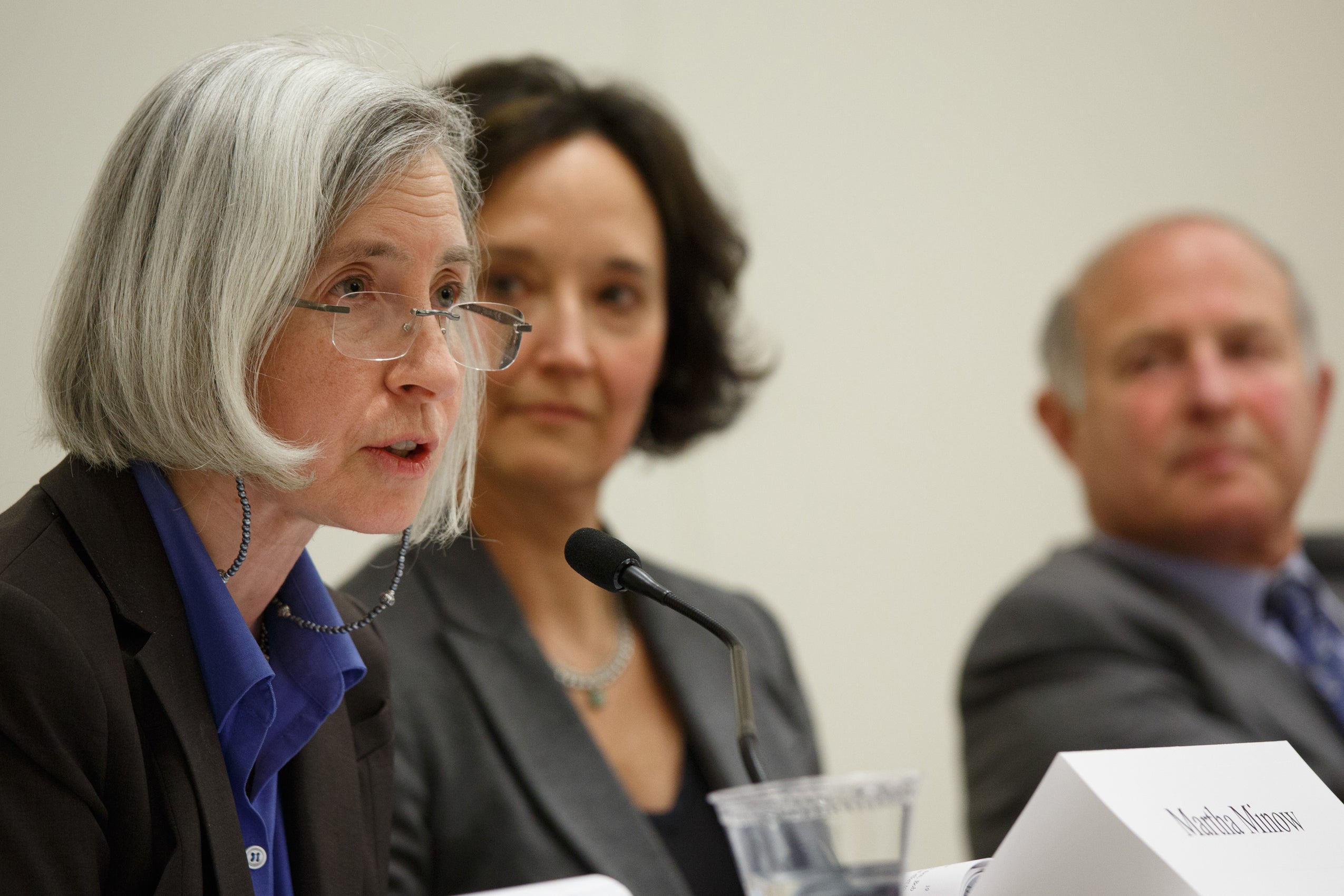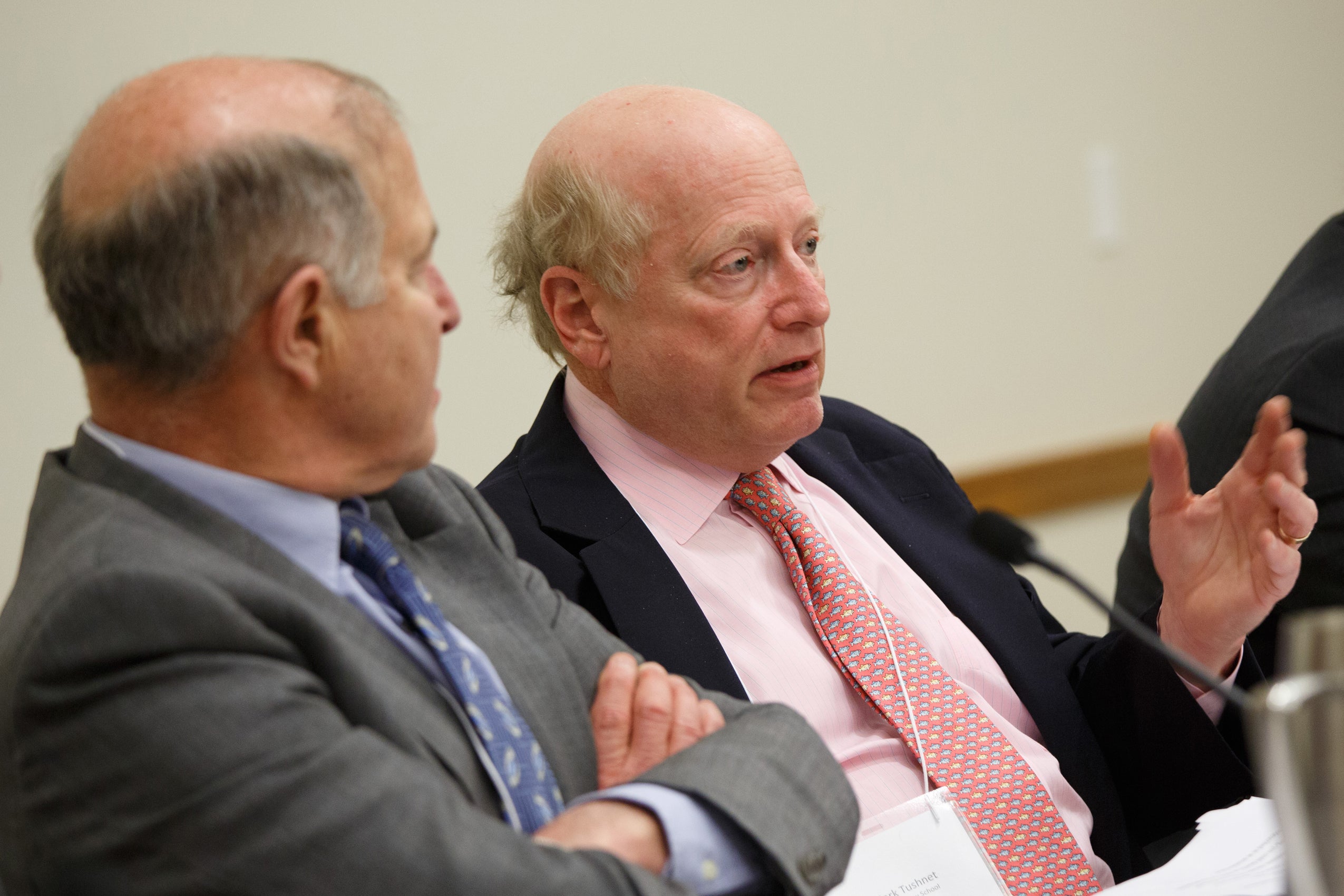Distinguished legal scholars gathered at Harvard Law School April 3–5 to discuss developing conflicts arising from competing claims by religious groups and gender-equality advocates.
The conference, “Religious Accommodation in the Age of Civil Rights,” addressed a broad range of controversies that have developed in recent years as marriage equality and anti-discrimination laws have prompted some religious organizations and private companies to assert claims of religious liberty and exemption from compliance with the law.

According to the conference organizer, HLS Professor Mark Tushnet, the planning for the event started more than a year ago after University of Southern California Gould Law School Professor Nomi Stolzenberg and HLS Dean Martha Minow came up with the idea and enlisted him to help organize it. Tushnet has had an interest in the issue of religious accommodation and its relationship to the Establishment Clause since writing a law-review article on the subject in 1987.
In all, the conference included 40 panelists and 120 other registrants, and Tushnet proclaimed it “an incredibly productive event.”
The intention, he said, was to initiate discussion about how to achieve solutions to the conflict between modern civil-rights laws and claims of religious freedom.
“I think the prevailing theme was that some kind of accommodation of these two strands was desirable but very difficult to work out, partly because some of the claims for religious accommodation are actually quite difficult to accommodate,” he said at the close of the conference. “The other thing that struck me was that there were a few people taking a strong separatist position—no accommodation at all—and I was surprised that there were people taking that position.”
By coincidence, the conference took place at a time of heightened attention to the issue of religious accommodation—the U.S. Supreme Court had heard oral arguments in a potentially landmark case in this area, Sebelius v. Hobby Lobby Stores, Inc. on March 25—and the case received much attention over the course of the conference.
In that case, Oklahoma City-based Hobby Lobby Stores, Inc. is arguing that the Free Exercise Clause of the First Amendment protects its religious beliefs against premarital sex and therefore is exempt from the Affordable Care Act’s preventive health care mandate requiring health insurers to provide contraceptives.
Panelist Marty Lederman, a Georgetown University Law Center associate professor, pointed out that all previous efforts by commercial entities to gain religious exemptions have failed, but “Hobby Lobby threatens to be an inroad into that long history.”
“What’s missing, in my view, is accommodation in a different sense—the kinds of accommodation that can occur when people of good will can sit across the table from each other to see what they can work out … The more that we litigate these cases, the less accommodation, in the deepest sense, we will have.”
Martha Minow
Panelists discussed other recent cases, including a claim by a New Mexico photography studio that it could refuse to shoot a same-sex couple’s commitment ceremony on First Amendment and religious grounds (rejected by the New Mexico Supreme Court) and similar efforts by others.
One common theme sounded by panelists was that the groups on the opposite sides of the legal debate need to talk with each other more.
“What worries me is that if the issues we are talking about are addressed by the courts, there are only two answers: yes or no,” Minow said as an opening-night panelist. “What’s missing, in my view, is accommodation in a different sense—the kinds of accommodation that can occur when people of good will can sit across the table from each other to see what they can work out.”
“The more that we litigate these cases, the less accommodation, in the deepest sense, we will have,” she said.
An advocate for LGBT and gender rights, Georgetown University Law Center Professor Nan D. Hunter struck a similar tone, saying that groups who seek to dissent from civil rights law should not be demonized.
“It’s tempting, but we have to rise above that,” she said. “Demonization does not lead to any good place.”
“I think the United States is at a point where the most serious challenge, and what we ought to dedicate ourselves to doing, is finding structural inequality, the embedded kind of inequality,” she said. “We need to take on a bigger sense of inequality, and I hope that will animate the principles of the very serious negotiation in which both sides are engaged.”
Columbia Law School professor Katherine Franke, however, struck a cautionary note in assessing the current legal debate over civil rights and religious accommodation.
“The gay community has pursed a democratic political process to change the law on the basis of substantive claims to justice … and the law is changing in response to that process,” she said. “A mere plea for tolerance could not have launched that project. By contrast, the claim to an exemption grounded in religion represents a claim to authority made from sources exogenous to the secular legal system itself and in profound ways poses a deterrent threat to the idea of state power and singular legal authority. The implications of this kind of claim are, in my view, really quite radical and deserve much deeper scholarly attention to unpack and elaborate the kinds of political promiscuity that they may open up.”
Conference Sessions
Public Lecture: Accommodation Emerged
Panelists: Michael McConnell, Director of the Constitutional Law Center at Stanford Law School; Louise Melling, Deputy Legal Director of the ACLU and the Director of its Center for Liberty; HLS Dean Martha Minow; Mark Tushnet, HLS professor specializing in constitutional law and theory
Chair: Jack Rakove, professor of political science and law at Stanford
Session 1: The Current Clash
Panelists: Frederick Gedicks, professor of law at Brigham Young University specializing in law and religion, constitutional law, and constitutional interpretation; Michael Helfand, associate professor of law at Pepperdine Law School, specializing in law and religion, arbitration, contracts, civil rights and constitutional law; Nan Hunter, Associate Dean for Georgetown’s LL.M. and S.J.D. programs; Martin Lederman, associate professor of law at Georgetown, specializing in constitutional law
Chair: Brad Sears, Assistant Dean of UCLA School of Law and Executive Director of The Williams Institute, and specializes in sexual orientation law, disability law, and U.S. legal and judicial systems
Session 2: Reflections on the Right to Religious Accommodation
Panelists: Richard Garnett, professor of law at The Law School at Notre Dame and a leading authority on questions and debates regarding the role of religious believers and beliefs in politics and society; Sarah Barringer Gordon, professor of constitutional law and of history at the University of Pennsylvania Law School and a widely recognized scholar and commentator on religion in American public life and the law of church and state; Andrew Koppelman, professor of law and of political science at Northwestern University; Nelson Tebbe, a professor of law at Brooklyn Law School whose scholarship focuses on the relationship between religious traditions and constitutional law
Chair: Nancy Rosenblum, Professor of Ethics in Politics and Government
Political Theory at Harvard University
Session 3: Reflections on Sexual and Gender Equality
Panelists: Caroline Mala Corbin, professor of law at University of Miami School of Law, specializing in constitutional law; Douglas NeJaime, professor of law at UC Irvine School of Law, where he teaches in the areas of family law, law and sexuality, and constitutional law; Reva Siegel, professor of law at Yale Law School; Kenji Yoshino, professor of constitutional law at New York University School of Law.
Chair: David Codell, nationally recognized attorney focusing on constitutional and appellate litigation, entertainment litigation, and commercial litigation.
Session 4: Complexifying Religious Accommodation
Panelists: Anita Allen, professor of law and of philosophy at the University of Pennsylvania Law School; Malick Ghachem, Senior Scholar at University of Maine School of Law, and a leading scholar in the law of slavery and race, and an expert in early French colonial and American legal history; John Inazu, Associate Professor at Washington Unversity Law School, who focuses on the First Amendment freedoms of speech, assembly, and religion, and related questions of legal and political theory; Nomi Stolzenberg, Chair in Law at USC Gould School of Law, her research spans a range of interdisciplinary interests, including law and religion, cultural pluralism, law and liberalism, and law and literature
Chair: Sandy Levinson, professor of government at the University of Texas Law School, specializing in constitutional law
Session 5: Complexifying Accommodation in Anti-Discrimination Law
Panelists: Mary Anne Case, professor of law at the Univserity of Chicago Law School, concentrating on the regulation of sex, gender, and sexuality, and on the early history of feminism; Chai Feldblum, Commissioner of the U.S. Equal Employment Opportunity Commission; Doug Laycock, professor of law at the University of Virginia School of Law, and one of the nation’s leading authorities on the law of remedies and also on the law of religious liberty; Steven Smith, professor of law at the University of San Diego Law School, Co-Executive Director, Institute for Law & Religion, Co-Executive Director, Institute for Law & Philosophy
Chair: Ira “Chip” Lupu, professor of law at George Washington University, and a nationally recognized scholar in constitutional law, with an emphasis in his writings on the religion clauses of the First Amendment.
Session 6: Accommodation in the Age of the Withering Welfare State
Panelists: Thomas Berg, professor of law and public policy at the University of St. Thomas School of Law. Berg is one of the leading scholars of law and religion in the United States; Ilan Meyer, Senior Scholar for Public Policy at the Williams Institute for Sexual Orientation Law and Public Policy at UCLA’s School of Law; Melissa Murray, professor of law at Berkeley Law School and her research focuses on the roles that criminal law and family law play in articulating the legal parameters of intimate life; Elizabeth Sepper, associate professor of law at Washington University Law School, and a health law scholar whose work explores the interaction of morality, professional ethics, and law in health care and insurance
Chair: Intisar Rabb, professor of law at Harvard Law School and co-director of the Islamic Legal Studies Program
Session 7: Looking Ahead
Panelists: William Eskridge, Professor of Jurisprudence at Yale Law School, specializing in statutory interpretation; Katherine Franke, Director, Center for Gender and Sexuality Law at Columbia Law School; Priscilla Ocen, associate professor of law at Loyola Law School, specializing in the relationship between race and gender identities and punishment; Alison Renteln professor of political science, anthropology, and School of Policy, Planning, and Development at USC Dornsife.
Chair: Abner Greene, professor of law at Fordham University, specializing in first amendment, church and state and constitutional law & theory
